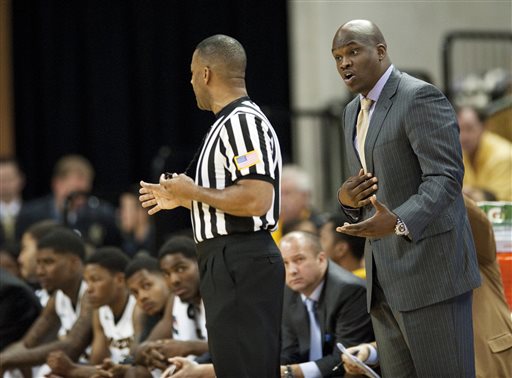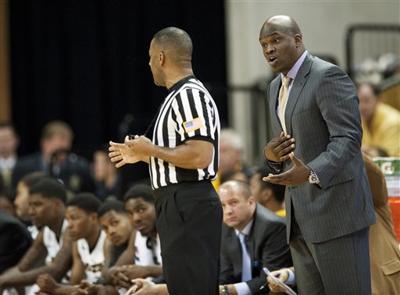COLUMBIA, Mo. — A decade ago, Tim Fuller left the Missouri men’s basketball coaching staff. Now, he’s back as the program’s first-ever general manager.
It’s a new role for a new age in college hoops, a time where agents are commonplace in recruitment and compensation is far from a taboo topic.
That will be part of Fuller’s responsibility under coach Dennis Gates: optimizing name, image and likeness spending and agent relations.
Fuller’s career in basketball has covered the preps, collegiate and business sides of the game. After playing at Wake Forest, he coached high school basketball. As a collegiate assistant, Fuller worked for Rick Pitino at Louisville, Frank Haith and Kim Anderson at MU, and most recently, former Tigers star Kim English at Providence. Fuller also spent time at Nike as an executive and played a key role in establishing the Overtime Elite preps and NIL operation.
People are also reading…
He detailed some of the lessons from those varied stops and his vision for the Mizzou men’s basketball GM position in an email exchange with the Post-Dispatch.
Post-Dispatch: Within this trend of programs now hiring GMs, those roles look different from program to program — and I’m sure will evolve as folks continue to navigate this time of change. How would you describe your vision for this particular GM role and how it will fit with the coaching staff?
Tim Fuller: This is my 25th year since graduating from Wake Forest and I’ve worked extremely hard to add value at every institution I’ve been and create strong relationships. I was part of the initial shift in high school student-athletes being compensated for their NIL as an executive at Overtime. I’ve had the opportunity to work as an executive at Nike and service NBA All-Stars like Andre Iguodala, Rajon Rondo, Caron Butler, Paul Pierce and a dozen others.
As general manager at Missouri, I look to wear many different hats but the main one is to serve under the head coach in a capacity to navigate properly the ever-changing landscape of college basketball and assist the assistant coaches in the recruiting of elite high school talent and preparing properly for the transfer portal.
P-D: Would you have thought back then when you were working at Mizzou with Haith and Anderson that you’d be back one day with the title of “general manager”?
Fuller: Mizzou has a special place in my heart and I’ve kept in touch with every head coach that has been there since I left. Coach Gates and I have maintained contact since his first month on the job and I was overjoyed when he extended the offer for me to join his staff and return the place I love. I have some unfinished business at Mizzou — meaning that I feel obligated to help attract championship-caliber talent to campus and pursue winning championships. I was part of one banner being hung at Mizzou and I’d like to be part of many more.
P-D: How much have you seen college basketball change over the last decade to where these GM roles are popping up around the sport?
Fuller: College basketball is on the verge of professional sports and closing the gap on the European model of athletes being enabled to provide for their families.
P-D: To many observers of college basketball and maybe even still to some people inside, it’s still strange to see agents become normalized figures within the sport. How do you navigate building those relationships? Is it different from the type of relationship you might have with a recruit or a recruit’s family?
Fuller: As I stated before — I’ve been fortunate to work in a variety of capacities during this 25-year expedition through basketball. I’m fortunate to be prepared for almost any scenario that could come in college basketball and those are forever changing.
I’m excited that Coach Gates has been receptive to innovation, desires creativity in the areas of marketing and branding for the athletes. We are responsible for preparing them to be well-rounded competitors at every level. The genesis of that process starts at 1 Champions Dr. (Mizzou Arena’s address) and continues every step until we transition them to their professional opportunity.
P-D: Having been within this college basketball landscape recently at Providence and parallel to it at Overtime Elite, what have you learned about today’s young basketball player and how to get the most out of this generation’s athletes?
Fuller: Today’s athlete has a significant number of distractions and needs consistent mentorship and oversight to manage their day-to-day, their own individual expectations and also those of the program. It takes a coaching staff that is driven for around-the-clock advisement and leadership because under performance is not an option for them.
The community, the collectives and the coaches are all counting on these young men to be at their best night in, night out. It takes an enormous effort from the graduate assistants to the strength and medical staffs and to the coaches and support staff to assist these young men in navigating these uncharted waters, while keeping their eyes on the goal of a national championship.
P-D: You’ve been around some very well-known players, coaches and executives in your career. Who would you credit as your biggest influences, both personally and in how you view basketball?
Fuller: Personally, while at Nike, (now-Dallas Mavericks GM) Nico Harrison and (Nike executive) Lynn Merritt challenged me beyond measure to outwork the competition. The mantra was to dominate the basketball industry and winning the day became a way of life. Recruiting and relationships are the lifestyle and it’s not something you pick up and put down.
Professionally, (now St. John’s coach) Rick Pitino and (Overtime CEO) Dan Porter.
Coach Pitino made every day a challenge and you had to be well prepared, organized and detailed in your areas of responsibility. The Louisville experience changed my life — I learned more about basketball from Rick Pitino in one year than I did in my previous 10 years prior to working for him.
But it was Dan Porter at Overtime Elite that pressed me to be more than a coach. Forcing corporate engagement, forcing an innovate mindset. At Overtime, I learned to ‘see around the corner,’ being ready for what’s coming before it’s seen by others takes special lenses. I thank Dan for sharing his lenses with me and equipping me with the tools to be a general manager at Mizzou.
Now I turn the page and look forward to learning from (the rest of the Missouri coaching staff: Coach Gates, Kyle (Smithpeters), Ryan (Sharbaugh), Matt (Cline), Steve (Wright), Coach (David) Nutt and the infamous Dr. (Joe) Carr.













